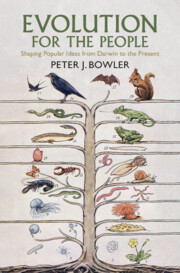Book contents
- Evolution for the People
- Evolution for the People
- Copyright page
- Contents
- Figures
- Preface
- 1 Bridging the Gap
- 2 Before Darwin
- 3 Reacting to the Origin
- 4 Human Ancestry
- 5 Evolutionary Epics
- 6 Challenging Darwinism
- 7 Reconfiguring the Ascent of Life
- 8 Social Evolutionism
- 9 The Evolutionary Synthesis
- 10 Toward the Modern World
- Bibliography
- Index
2 - Before Darwin
Published online by Cambridge University Press: 21 November 2024
- Evolution for the People
- Evolution for the People
- Copyright page
- Contents
- Figures
- Preface
- 1 Bridging the Gap
- 2 Before Darwin
- 3 Reacting to the Origin
- 4 Human Ancestry
- 5 Evolutionary Epics
- 6 Challenging Darwinism
- 7 Reconfiguring the Ascent of Life
- 8 Social Evolutionism
- 9 The Evolutionary Synthesis
- 10 Toward the Modern World
- Bibliography
- Index
Summary
Evolutionary ideas were in circulation before Charles Darwin began his work and were widely disseminated, arousing much controversy. In addition to the writings of Erasmus Darwin (Charles’ grandfather), French ideas gained some currency in the English-speaking world, especially the views of J. B. Lamarck. These ideas were taken up by radical thinkers who rejected divine creation, to the horror of conservatives. Early discoveries of fossils played a significant role in arousing public interest in the history of life and were often seen as evidence that life had ascended a scale of development (the chain of being) toward humanity. The first-known dinosaurs were fitted into the chain as gigantic lizards, not as evidence of creatures totally unlike anything now alive. This model was adapted to middle-class values in Robert Chambers’ Vestiges of the Natural History of Creation in 1844, again arousing controversy but gradually gaining some credibility beyond the scientific community.
Keywords
- Type
- Chapter
- Information
- Evolution for the PeopleShaping Popular Ideas from Darwin to the Present, pp. 25 - 55Publisher: Cambridge University PressPrint publication year: 2024

